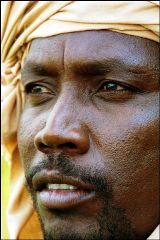African mediators seek to bring Darfur rebel commanders to peace talks
ABUJA, Oct 23 (AFP) — African Union mediators sent a mission to Chad to seek to persuade nervous Sudanese rebel leaders to attend peace talks on the Darfur crisis in the Nigerian capital Abuja.

|
|
Bahar Idriss Abu Garda JEM’s Secretary General. |
Darfur’s rebel political leaders have been holding informal discussions with the Khartoum government since Friday, but the insurgents’ field commanders have been reluctant to show themselves, citing concerns over their safety.
The commander of the African Union’s embryonic peacekeeping force for Darfur, Major General Festus Okonkwo, said that mediators hoped to have the guerrilla chiefs in place before the start of formal dialogue on Monday.
In the meantime, he said, leaders from the rebel Sudanese Liberation Movement (SLM) and Justice and Equality Movement (JEM) were stuck in the Chadian capital Ndjamena, awaiting an AU escort to the conference.
“These are delegates whose presence is crucial to the peace talks because they are from the field in Darfur. I don’t see any meaningful progress in the talks without their presence,” Okonkwo explained.
“We on our side have tried to facilitate their arrival. We moved them from their bases in Nyala and El-Geneina to our headquarters in El-Fasher. I personally went to their base to do that,” the Nigerian general added.
“We then got the French government to assist in moving them to Ndjamena. I understand the AU special envoy has gone to Ndjamena to bring them. They are due in Abuja today,” he told reporters at the conference venue.
“The rebels were suspicious of their safety and security, that is why they insisted on being brought here by the AU. We detailed a Lieutenant Commander from Chad to bring them but it appears they don’t trust him,” he said.
JEM leader Ahmed Tugod confirmed the delay: “Some of the delegates arrived from Ndjamena last night, but we are still expecting some to arrive today. Consultations will continue to go on, but their presence is very important.”
The western Sudanese province of Darfur has been wracked with conflict since February last year when the JEM and SLM rebelled against the alleged marginalisation of the region’s black African tribes by Khartoum’s Arab regime.
The government responded by unleashing an Arab proxy militia, the Janjaweed.
More than 70,000 people — the vast majority of them civilians — have been killed in the fighting and more than 1.5 million people driven from their homes and into squalid and dangerous refugee camps, according to UN estimates.
A ceasefire is theoretically in place while the African Union attempts to broker a political solution, but aid agencies say that bandit attacks continue, hampering efforts to bring in large-scale food deliveries.
Okonkwo’s AU force ought to be able to help monitor the ceasefire, but so far only Nigeria and Rwanda have formally committed troops and it may not be up to its planned strength of 3,250 for two or more months, officials warn.
“We don’t know when the troops will start arriving in Darfur since the approval was only given about three days ago. Some countries have yet to get the request to contribute troops,” Okonkwo said.
Meanwhile in Abuja, mediators hope to quickly extract from the warring parties agreements to respect two protocols — one on humanitarian issues, the other on security — in order to stabilise the situation while talks continue.
If real progress is not made under AU auspices then the international community may feel compelled to act.
The United Nations Security Council has already threatened to impose economic sanctions if Khartoum fails to rein in its gunmen, while the United States has accused the government of committing genocide.
International pressure on Sudan continued to mount on Saturday with European Union foreign policy chief Javier Solana due to become the latest high-profile official to visit Khartoum to press for a peaceful end to the conflict.
